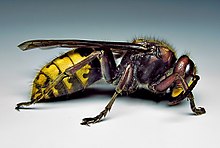
Back زنبوراوات Arabic زنبورات ARZ Aviespa AST Vespins Catalan Echte Wespen German Vespinae Spanish Ühisherilased Estonian زنبوریان زردجامه Persian Yhteiskunta-ampiaiset Finnish Vespinae French
You can help expand this article with text translated from the corresponding article in Japanese. (June 2018) Click [show] for important translation instructions.
|
| Vespinae Temporal range:
| |
|---|---|

| |
| European hornet, Vespa crabro | |
| Scientific classification | |
| Domain: | Eukaryota |
| Kingdom: | Animalia |
| Phylum: | Arthropoda |
| Class: | Insecta |
| Order: | Hymenoptera |
| Family: | Vespidae |
| Subfamily: | Vespinae Latreille, 1802 |
| Genera | |
The subfamily Vespinae contains the largest and best-known groups of eusocial wasps, including true hornets (the genus Vespa), and the "yellowjackets" (genera Dolichovespula and Vespula).[1] The remaining genus, Provespa, is a small, poorly known group of nocturnal wasps from Southeast Asia. One genus, Palaeovespa, has been described the Paleocene to Eocene fossil records of North America and Europe.[2] Collectively, the group can be found on all continents except Antarctica, and several of these wasps are invasive species, introduced beyond their native ranges, and can be major pests.

- ^ Jm, Carpenter (1997). "Checklist of the species in the subfamily Vespinae (Insecta : Hymenoptera : Vespidae)". Nat Hist Bull Ibaraki Univ. 1: 51–92.
- ^ Yamane, Seiki; Yamane, Sôichi (2021). Starr, Christopher K. (ed.). Vespinae. Cham: Springer International Publishing. pp. 1000–1008. doi:10.1007/978-3-030-28102-1_133. ISBN 978-3-030-28101-4. Retrieved 2023-06-12.
{{cite book}}:|work=ignored (help)